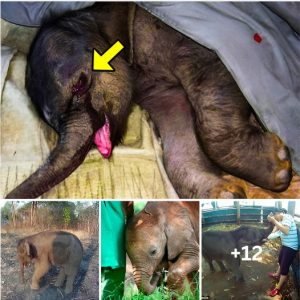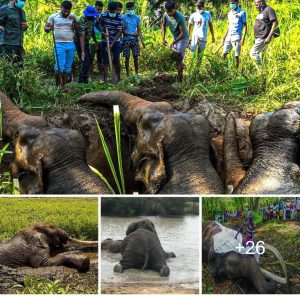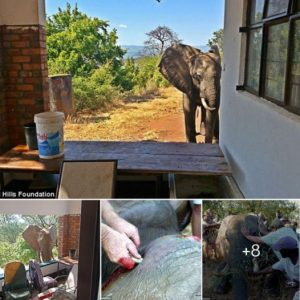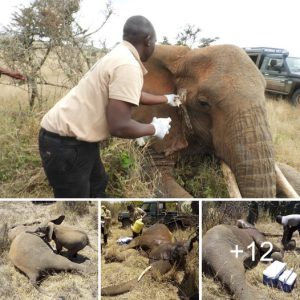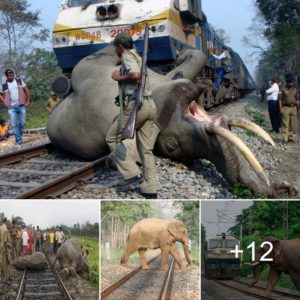
In the afternoon of 12th August, Stephen Tembo was driving his motorbike in the Rufunsa region of Luangwa when he came across a herd of over 300 elephants. This is not an unusual occurrence in this area, where elephants move in very large numbers (as we witnessed first-hand) and due to certain parts of the landscape, the elephants and people must share the same roads and pathways, with the river on one side and the mountains on the other. Unfortunately, this causes an elevated level of human-elephant conflict (HEC) as these large herds move along the villages causing damage as they go. Stephen avoided the elephants and returned the way he had come, only to be confronted with another ‘super herd.’ He found shelter in Chikumbi Village as the herd passed but noticed a very small elephant amongst a group of bulls towards the back of the herd. She was calling out for her mother, but none of the elephants took notice of her and they left her alone as she slowed up. She moved through the village screaming and disoriented until Stephen called for help and a few men came together. They caught her and tied her to a tree with a soft rope around her back leg.



Image 1: Chikumbi Community Village watching Elephant Herd
Image 2: Chikumbi Community Village Entrance
Image 3: Chikumbi Community Village where Chikumbi was rescued
Rufunsa has been an orphan elephant hotspot over the years due to its geography – here Mozambique, Zimbabwe, and Zambia all meet, divided by the Zambezi (Zim-Zam) and Luangwa (Moz-Zam) Rivers. These country borders are very porous, and a lot of illegal activity takes place across them, including wildlife crime (poaching and trafficking). In addition, with the high level of human-wildlife conflict, this area has historically created more orphaned elephants than anywhere else in Zambia (we have responded to 16 rescues in this area to date). With this history many people in this area are familiar with Game Rangers International and our elephant rehabilitation work. Using the Orphaned Elephant Hotline number (which has been promoted through stickers in the region) Stephen called in the rescue and our team immediately started connecting all the necessary personnel, most importantly the Department of National Parks and Wildlife (DNPW), with Rapheal, our Resource Protection manager based in Rufunsa, who sent officers to the village to check on the elephant and provide support until we could arrive. Our locally based Community Outreach Ranger, Chrispine, worked with Stephen and Rapheal to ensure the calf was cared for most appropriately overnight before our team could arrive (it is a 7-hour journey from Lusaka).
Following our instruction, the carers wrapped cloth around the restraining rope to minimise the risk of ‘rope burn,’ and whilst tying her may not seem a pleasant option, in such a case it is quite necessary to prevent the elephant from disappearing into the bush altogether as there was no suitable enclosure to hand. The Community Ranger, Obrian, was stationed with her and ensured she was brought browse and fresh water throughout the night. We were so impressed with the level of care given to this little elephant, particularly when so many interactions between people and elephants here are negative as they both strive for the same resources.



On arrival the next day our team stabilised the calf further, providing her with essential electrolytes and the reassurance she needed. It was reported she only laid down briefly since her rescue due to all the activity and the strange environment she found herself in. She could not relax, and was in desperate need of some rest. It was apparent that she had lost body condition with her hip bones prominent and cheek bones sunken, indicating dehydration and malnutrition – she must have lost her mother a few days earlier. Whilst it is hard to understand what caused the separation, we do know that mother elephants do not easily leave their young and there is a high level of poaching in this area. We estimate she is only 4 months old, so her mother’s milk is vital for survival at this stage. Despite being such a young, milk dependent calf, we immediately noticed her well-developed control and proficient use of her trunk as she drank waterand browsed ferociously. She is demonstrating fierce independence despite her loss and trauma, and we are hopeful for her emotional and physical recovery.
She was named ‘Chikumbi’ (Chi-koom-bi) after the village community who rescued her and cared for her so attentively. The name means “rain cloud” in the local language of Nyanja, and here the start of the rains is something hugely celebrated, offering hope and prosperity.
Whilst our Rescue Team (Rachael and Keeper Martin), focused on supporting Chikumbi, Chrispine and Jon (GRI – Chief Executive Officer) spent time thanking the community and reinforcing the messaging of reporting injured or abandoned wildlife as well as any conflict concerns so our teams can support them where they need it most. There was a formal presentation of Meali Meal for the helpers and many words of gratitude expressed both ways. With thanks to the support of Jackson Hole Community, GRI is developing a permanent presence in the Rufunsa Game Management Area in partnership with Conservation Lower Zambezi to provide increased law enforcement presence and vital Community Outreach support to safeguard this area of incredible natural beauty and vibrant wildlife.

Image: Jon (GRI CEO) shows our appreciation for support
The DNPW Principal Vet Dr Innocent Ng’Ombwa arrived on the scene with our Rescue Trailer and Chikumbi was medically assessed and treated with immune support before being loaded into the trailer. Being such a tiny elephant, she was easily lifted in a cargo net and placed inside the trailer in a deep bed of hay where the rope was removed from her leg. As we started the long journey to Lusaka, Chikumbi initially had to focus her energies on stabilising herself, as the rescue vehicle tackled off-road, rocky tracks for nearly an hour from the rescue site. . Once we reached the tarmac, she was able to relax in the trailer and it was not long before she laid down for the first time in over 24 hours and had a very well-earned rest. We stopped to check on her every hour of the journey and on a couple of occasions she slept through the stop! At other times she was on her feet browsing and accepted electrolytes from Martin, the Keeper, who she had very quickly started to trust. However, she did not understand the bottle so would only drink from a bucket.
After an 8-hour drive Chikumbi finally arrived at the Elephant Nursery at the GRI – Wildlife Discovery Centre in Lusaka National Park, where she quickly followed Martin out of the trailer and walked straight into a stable. It was the early hours of the morning and a chilly 7°C on arrival, almost 10°C cooler than where we had come from, so Martin quickly put blankets on her which she tolerated very well. She accepted some more electrolytes and quickly settled herself for a 3-hour long sleep, which is exceptionally long for an elephant, but clearly very much needed! In the morning, the other elephants were interested to smell and touch this tiny new addition to their herd, but they were let out for the daily walk in the Park and Chikumbi will for now be given some days of bed rest at the boma to recover her strength and energy and start to regain some condition before meeting the herd without a barrier. A physical meeting at this stage could cause stress and energy loss and right now she needs to retain every bit of energy she can to focus on recovery and adjustment to her new life with this orphaned family.




It is very early days of recovery for this little calf and the Keepers will not leave her side. We will do everything we can to bring her back to full health and strength and give her a second chance for life in the wild again one day.
This rescue would not be possible without the support and dedication of Jackson Hole Community, Department of National Parks and Wildlife , International Fund for Animal Welfare , David Shepherd Wildlife Foundation , Olsen Animal Trust
